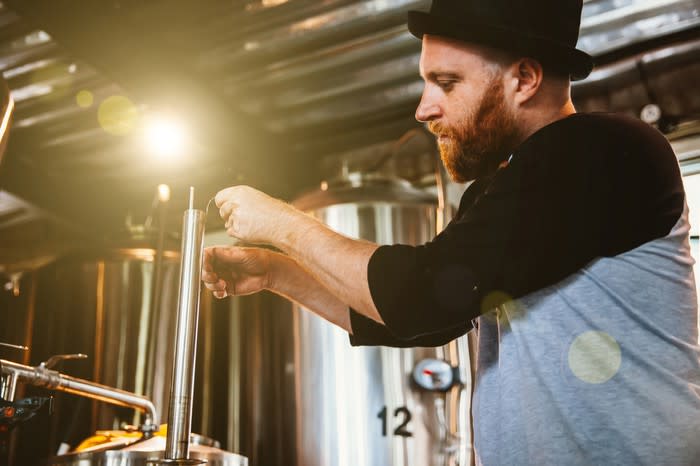Craft Beer Keeps Growing as Consumers Go Local
Craft beer is still growing in 2019, with production volumes up 4% during the first six months of the year. With nearly 7,500 craft brewers operating in the U.S., over 1,000 more in existence than there were at this time last year, and with as many as 3,000 more in the planning stages, the craft beer industry still has plenty of life.
Yet craft brewing isn't the same as it was five years ago, let alone a decade or more in the past. Today, the most popular alcoholic beverages are non-beer drinks like hard cider, hard tea, and hard seltzer. Boston Beer has been able to show growth only because of its Angry Orchard hard cider and Truly hard seltzer, which has a 39% share of the market and quickly became the second-largest hard seltzer behind White Claw.
The popularity of these niche beverages has attracted the attention of Anheuser-Busch, which intends to make a big splash, while other brewers, such as Pabst Brewing, look to expand the category in new directions with their own innovations, like hard coffee.

Image source: Getty Images.
Small is where it's at
But it's not these large, well-known brewers driving the market. Instead, the craft beer industry's growth is coming from microbreweries, taprooms, and brewpubs as beer drinkers drive the trend local and support their hometown brewers.
Brewers Association chief economist Bart Watson said in a press release that it's a sign of a maturing market, creating conditions "that make it difficult for all breweries to grow simultaneously."
Earlier this year the trade group noted the 50 fastest-growing craft brewers were among the industry's smallest, producing on average just 1,350 barrels a year, combining for about 10% of the industry's total production. To put that in perspective, Boston Beer produced 4.3 million barrels last year, or about 8% of the craft beer industry's total.
Yet as Anheuser-Busch, Constellation Brands, Heineken, and other large brewers seek to offset their own declining beer volumes, they've begun buying up some of the fastest-growing small and regional brewers. A-B has bought over a dozen craft brewers, Constellation spent $1 billion on Ballast Point Brewing in 2015, and Heineken ended up acquiring the part of Lagunitas Brewing that it didn't already own in 2017.
The new neighborhood bar
Even so, they're not the ones pushing the industry forward. The ones showing growth are microbreweries and brewpubs, which together account for about 96% of all breweries operating today, and that perfectly matches the industry trends.
The Brewers Association defines a microbrewery as "a brewery that produces less than 15,000 barrels of beer per year and sells 75 percent or more of its beer off-site," while a brewpub is "a restaurant-brewery that sells 25 percent or more of its beer on-site and operates significant food services. The beer is brewed primarily for sale in the restaurant and bar, and is often dispensed directly from the brewery’s storage tanks." There are also "taproom breweries," which don't have significant food service options.
Beer drinkers are looking for local flavor, and hanging out at the local taproom is now how consumers are sampling beers and finding where the real innovation is occurring. The most popular styles that all the bigger breweries latched on to, such as hazy New England IPAs or gose sour beer, were launched or revived by these really small breweries. Only after these new styles gained popularity did the bigger brewers jump on the bandwagon.
So the craft beer industry is still growing, but not how it did in the past and not from its traditional pillars of support. The biggest players in craft brewing aren't the real innovators, and with craft beer returning to its roots, growth may go on longer than many suspected. That may be the most surprising development of all.
Rich Duprey has no position in any of the stocks mentioned. The Motley Fool owns shares of and recommends Boston Beer. The Motley Fool recommends Anheuser-Busch InBev NV and Constellation Brands. The Motley Fool has a disclosure policy.
This article was originally published on Fool.com

 Yahoo Finance
Yahoo Finance 